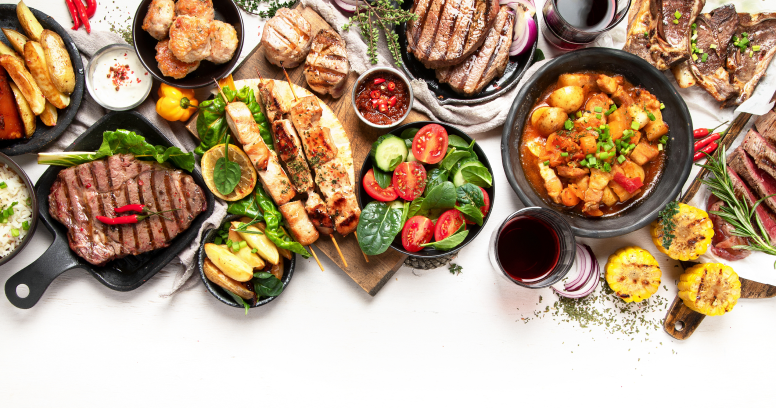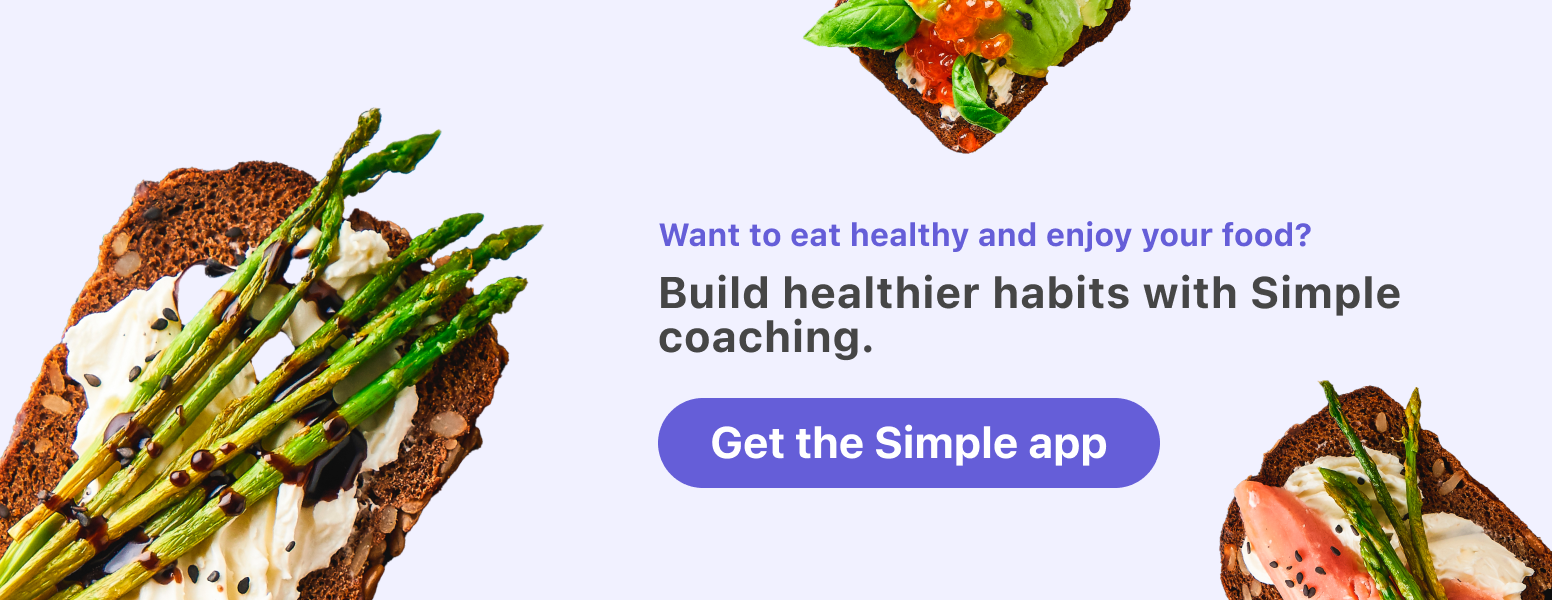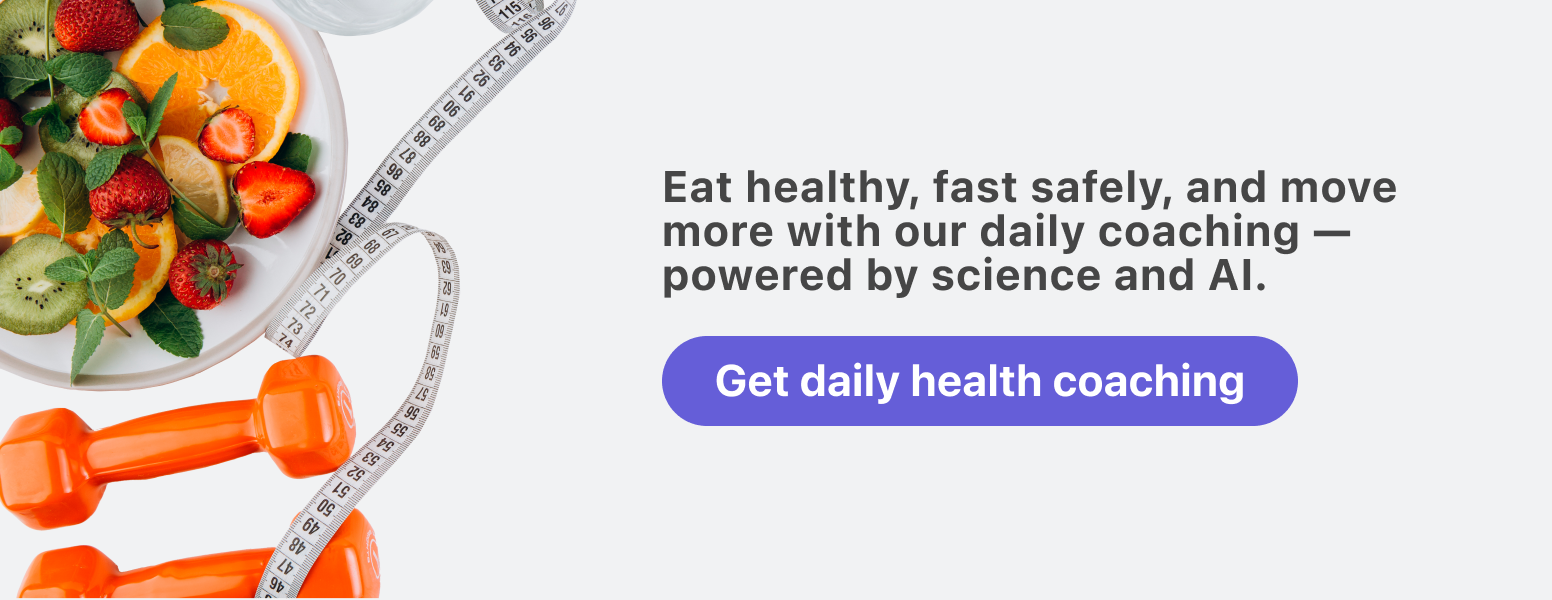How to break the emotional eating cycle

Have you ever felt a bit down and sought comfort in a snack? If so, you’re not alone.
Many people turn to food when they feel anxious, upset, lonely, or some other emotion. In fact, 58% of Americans report gaining weight thanks to stress-related eating.[1]

Almost everyone eats for emotional reasons, at least sometimes. For some people, it’s no big deal.[2] But for other people, emotional eating causes problems like unwanted weight gain, frustration and guilt, and health issues.[3,4]
If emotional eating is causing trouble for you, and you want to change this pattern, this article is for you. We’ll cover what emotional eating is, how it’s different from physiological hunger, and how to start breaking the cycle.
No need to embark on this wellness journey alone! Let us guide you in understanding and conquering emotional eating. Start with the Simple quiz and unlock tailored insights, recipe ideas, and more in our app!
Important:
While a bit of emotional eating is normal and does not cause many problems for people, some folks really struggle.
If you’re feeling lost, stuck, or overwhelmed by your emotional eating, and/or if your eating is causing problems in your daily life, please consider seeking help from a healthcare provider who specializes in disordered eating.
What is emotional eating?
Emotional eating means using food and eating to change how we feel or eat in response to particular emotions.[4,5]
We can use food and eating to:
- feel better when we feel down, lonely, angry, sad, or other difficult emotions
- “amp up” or increase stimulation when we’re bored
- calm down or decrease stimulation when we’re anxious or overwhelmed
- keep the “good times rolling” when we’re happy and having fun
- use food as a reward
Emotional vs. physiological hunger
Physiological hunger is our body’s need to eat. Our brain detects that we need energy and nutrients, so it sends signals to get our tummy rumbling.[6] When you’re physiologically hungry, you might notice:
- feeling an empty or “hollow” sensation in your stomach
- hearing your stomach rumbling
- experiencing a headache, being lightheaded, or even feeling a little dizzy
- becoming irritable or “hangry” (hungry + angry)
- feeling weak
- feeling “spaced out” and unfocused
When you’re physiologically hungry, any food will do.
Emotional hunger is our desire to eat in response to emotions.[5] When you’re eating emotionally, you might notice that you are:
- experiencing strong feelings like being upset, anxious, or sad (or you might just find yourself eating with no idea why)
- having strong and sudden cravings for specific foods
- becoming very preoccupied with specific foods, especially those high in fat and sugar or “comfort foods”[7]
- eating past the point when you are physically full
- feeling shame, regret, or guilt, especially afterward — or being confused about why you ate so much and couldn’t seem to stop

Why do we eat emotionally?
We have two body systems that regulate what we eat and how much.[5]
- “Need to eat” system: The homeostatic system that creates physiological hunger helps ensure we get enough energy and nutrients.
- “Want to eat” system: The hedonic system helps us enjoy food and eating. You can think of this as our appetite and desire system.
These systems are controlled by the brain, but they get input from the rest of the body (especially our digestive tract), thoughts, feelings, activities (like exercise), and the environment.
Some major factors that affect our desire to eat emotionally include:
- stress
- sleep
- habits and routines that we’ve learned
- environmental cues
Stress
When you’re stressed, your body releases hormones like cortisol, adrenaline, or noradrenaline.[8]
In the short term, these hormones suppress your appetite. (After all, you don’t want to be thinking about a snack when a bear is chasing you.)
But in the long term — for instance, if you have a stressful job, are slogging through a tough semester at school, or are spending months caregiving for an aging parent — these hormones often make you want to eat more.[9,10,11]
Sleep and fatigue
Sleep helps manage our appetite and hunger along with our metabolism and mood.[12,13]
When we don’t sleep well or enough, we’re hungrier, have more cravings, and are less able to deal productively with difficult emotions.[11] When we’re overtired, we become more like tantrum-throwing toddlers or impulsive teenagers than calm and rational adults!
And, when we’re fatigued — for instance, after a long workday and fighting to get the kids in bed — that’s also when the emotional eating gremlins show up. (Ever notice how you rarely make great food decisions late at night? Yup, that’s why.)
Learned habits and routines
We often learn to connect emotions and particular foods or eating rituals.[14,15]
Think cake on birthdays, ice cream when you’re sad, pizza to celebrate Friday night, or candy as a “reward.”
Nothing wrong with this — unless it becomes a habit we don’t even notice or feel like we can’t break. Or when we don’t have other ways to celebrate besides food.
Environmental cues
Food triggers in our environment can also prompt us to start eating, and people who eat emotionally may be extra sensitive to these.[16]
Brownies in the break room when we’re hitting that mid-afternoon slump and “work sucks” boredom? Late-night Netflix and snacks after a tough day? Heck yes! These cues are like a dog whistle for our emotional-eating side.
Discover your triggers and patterns by tracking your food intake with Simple’s food journal. Plus, gain access to tons of other resources, including mindful recipe ideas. Begin your journey with us by taking the Simple quiz!
How to start breaking the chain

Again, almost all of us will eat for emotional reasons sometimes. And that’s OK! However, if you want to start doing this less, here’s your checklist of how to start.
1. Begin with self-compassion.
Approaching yourself with gentle kindness, like you’d do for someone else you loved, will work better than self-criticism or harsh judgment. More stress and threats will just make emotional eating worse, so dial down any attacks that are happening inside your brain.
Instead, take a moment to befriend yourself.
Acknowledge that this is hard sometimes, and you’re doing your best. Recognize that you might want to do things differently and that you see and appreciate yourself trying.
You might give yourself some loving honesty about what you want to change, but always with a spirit of care and compassion.
2. Notice your “behavior chain.”
Think about emotional eating as the last link in a chain of events, actions, thoughts, and feelings that came beforehand.
For instance:
I had a stressful day at work → I felt frustrated → I came home through the kitchen door → There was a bag of snacks on the kitchen table → I started eating them and didn’t quit till the bag was empty.
Or:
I visited my family → I was already feeling anxious → My mom said something that annoyed me → I grabbed a second helping of food, even though I was already full.
The step-by-step descriptions above can give us ideas about how to “break the chain” to take ourselves along another path.
For instance:
I had a stressful day at work → I felt frustrated → NEW ACTION: I stopped on the way home at a park and walked around for 15 minutes.
I visited my family → I was already feeling anxious → My mom said something that annoyed me → NEW ACTION: I went to the bathroom and took 5 deep breaths, then splashed cold water on my face.
After a walk in the park or some chill-out time in the bathroom, you’re less likely to react automatically and more likely to choose your next actions calmly.
3. Substitute something else for what you normally do — especially something that makes you feel better or differently.
Notice how above you would do something else in place of what you’d normally do? That’s one “pro tip” you can start doing immediately.
Good options include:
- exercising, even if that’s just 30 seconds of jumping jacks
- getting outside, especially in nature
- retreating to somewhere private, like the bathroom, to take 5–10 deep, calming breaths
- finding something to make yourself laugh
- playing with or snuggling a pet
- talking to someone you like — and by that, we mean actually talking, not texting
- listening to music that changes your mood, such as your “fired-up power songs” or your “chill out relaxing tracks” — bonus points for singing along!
- touching something cold, like holding an ice cube or putting your hand under cold water
- doing a hobby you enjoy, especially something creative or hands-on (think: knitting, woodworking, painting, playing the piano, etc.)
- snuggling into something comforting and fuzzy, like a blanket
4. Create a “menu” of emotional-gear-switching options to have on hand.
Review the options above and come up with your own list of what will work for you. Then, write them down and keep them handy.
Do them as soon as you feel the urge to eat emotionally or even proactively — for instance, even if you didn’t have a bad day at work, why not stop at that park anyway?
A little planning can help you stay focused when your brain might be feeling scrambled and ready to derail you.

5. Build a longer-term mindfulness practice.
Tips 1–3 are good in the short term. But you want something more than a quick fix, right?
So, consider improving your awareness of what’s happening moment to moment, aka mindfulness.[17] This doesn’t mean any special meditation practice.
Rather, find a few minutes each day to:
- Scan your body from head to toe, just noticing any sensations you’re experiencing without judgment. For instance, see if you can notice things like your heart rate or anything that feels sore or tight.
- “Check in” with yourself and ask: “Hey me, how am I feeling? What am I thinking? Is anything making me feel too ‘up’ or ‘down’? If so, what?”
- Sit quietly for a minute or two without distractions. Just … be. Take some deep, slow breaths if you like.
6. Explore the opposite of the triggers.
You might remember some triggers include:
- stress
- sleep
- habits and routines that we’ve learned
- environmental cues
Let’s try some Opposite Day exercises.
- To combat stress: Do a quick “stress inventory” of your life.
- What stressors are negotiable? (For instance, can you cancel a social event with people you don’t know well and don’t like?)
- Can you approach other stressors more productively? (For instance, scheduling 20 minutes of brisk walking during your lunch break to get away from the work grind?)
- To sleep better: Consider what you’re currently doing before bed.
- Can you add small actions to your pre-bed routine (or cut down on others, like TV) to help yourself relax?
- To adjust habits and routines: Review one day’s routine. Look for things you might do differently, simply to “break the chain” of your normal “autopilot.” For instance:
- Can you take a different route home, do activities at a different time or in a different place, etc.?
- If you eat emotionally in the evenings, what’s an evening hobby you can do instead?
- In other words, how can you “shake things up”?
- To change environmental cues: Review the areas and triggers that normally prompt you to eat emotionally.
- Can you adjust them somehow? For instance, can you store snack foods somewhere inconvenient (such as a basement cupboard) so they aren’t within easy reach?
- Can you create more supportive environments? For instance, could you set aside a corner with a comfy chair and fuzzy blanket where you can relax and calm down?
When to seek professional help

If you feel overwhelmed or unable to function, or if you notice your emotional eating is interfering with normal everyday activities like work, school, or relationships, it might be time to consider getting more support.
There are many healthcare professionals specially trained to help you develop a healthier relationship with food.
It’s OK to ask for help — your doctor can give you the tools you need to break the emotional eating cycle.
Pay attention to the timing of your eating episodes. Emotional eating often occurs suddenly and is driven by a specific emotion rather than physical hunger. Keeping a food diary can also help you identify patterns.
You might also notice feeling particular emotions after eating — such as guilt, regret, frustration, confusion, or shame.
For most people, never eating emotionally isn’t realistic. Almost all of us sometimes eat in response to emotions, which is OK.
Emotional eating becomes a problem when it interferes with our health, well-being, daily life routines, and relationships. But, if it’s occasional and mild … it’s usually no big deal and part of the normal ebb and flow of being human!
Often, making sure to cover the nutritional bases can help because this can help manage hunger and improve satiety while giving the body the nutrients it needs for mental and physical health. This can include:
- eating enough protein
- eating enough fiber
- eating plenty of fruits and vegetables
- drinking lots of water
Avoid restrictive or crash diets or rigid “food rules,” as this will usually make things worse.
Always start with compassion. Take a deep breath or two. Slip-ups happen. You’re normal!
Acknowledge the lapse, learn from it, and recommit to your efforts to break the cycle. It’s all part of the journey to healthier habits. And remember — reach out to someone who can help support you!
Confronting emotional eating can be challenging, but with our Simple app, you’re always supported by joining a community that truly gets it. We’re with you every step of the way. Take the Simple quiz to get started today!
- American Psychological Association. Stress in America 2022: Concerned for the future, beset by inflation. 2023.
- Craighead LW. The appetite awareness workbook: How to listen to your body and overcome bingeing, overeating, and obsession with food. New Harbinger Publications; 2006. 200 p.
- Brytek-Matera A. Negative affect and maladaptive eating behavior as a regulation strategy in normal-weight individuals: A narrative review. Sustain Sci Pract Policy. 2021 Dec 11;13(24):13704.
- Godet A, Fortier A, Bannier E, Coquery N, Val-Laillet D. Interactions between emotions and eating behaviors: Main issues, neuroimaging contributions, and innovative preventive or corrective strategies. Rev Endocr Metab Disord. 2022 Aug;23(4):807–31.
- Reichenberger J, Schnepper R, Arend AK, Blechert J. Emotional eating in healthy individuals and patients with an eating disorder: Evidence from psychometric, experimental and naturalistic studies. Proc Nutr Soc. 2020 Aug;79(3):290–9.
- Ahima RS, Antwi DA. Brain regulation of appetite and satiety. Endocrinol Metab Clin North Am. 2008 Dec;37(4):811–23.
- Fuente González CE, Chávez-Servín JL, de la Torre-Carbot K, Ronquillo González D, Aguilera Barreiro M de LÁ, Ojeda Navarro LR. Relationship between emotional eating, consumption of hyperpalatable energy-dense foods, and indicators of nutritional status: A systematic review. J Obes. 2022 May 18;2022:4243868.
- Bose M, Oliván B, Laferrère B. Stress and obesity: The role of the hypothalamic-pituitary-adrenal axis in metabolic disease. Curr Opin Endocrinol Diabetes Obes. 2009 Oct;16(5):340–6.
- Aaseth J, Roer GE, Lien L, Bjørklund G. Is there a relationship between PTSD and complicated obesity? A review of the literature. Biomed Pharmacother. 2019 Sep;117:108834.
- Björntorp P. Do stress reactions cause abdominal obesity and comorbidities? Obes Rev. 2001 May;2(2):73–86.
- Konttinen H. Emotional eating and obesity in adults: The role of depression, sleep and genes. Proc Nutr Soc. 2020 Aug;79(3):283–9.
- Lin J, Jiang Y, Wang G, Meng M, Zhu Q, Mei H, et al. Associations of short sleep duration with appetite-regulating hormones and adipokines: A systematic review and meta-analysis. Obes Rev. 2020 Nov;21(11):e13051.
- Liu S, Wang X, Zheng Q, Gao L, Sun Q. Sleep deprivation and central appetite regulation. Nutrients. 2022 Dec 7;14(24).
- Alonso-Alonso M, Woods SC, Pelchat M, Grigson PS, Stice E, Farooqi S, et al. Food reward system: Current perspectives and future research needs. Nutr Rev. 2015 May;73(5):296–307.
- Sutton CA, L’Insalata AM, Fazzino TL. Reward sensitivity, eating behavior, and obesity-related outcomes: A systematic review. Physiol Behav. 2022 Aug 1;252:113843.
- Černelič-Bizjak M, F. GRP. Predictors of binge eating: Relevance of BMI, emotional eating and sensivity to environmental food cues. Nutrition & Food Science. 2021 Jan 1;52(1):171–80.
- Chew HSJ, Lau ST, Lau Y. Weight-loss interventions for improving emotional eating among adults with high body mass index: A systematic review with meta-analysis and meta-regression. Eur Eat Disord Rev. 2022 Jul;30(4):304–27.
